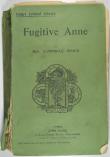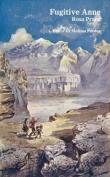AustLit
Latest Issues
AbstractHistoryArchive Description
'Anne Bedo is unhappily married. Her husband, Elias, is an abusive drunk who cruelly mistreats her, and she decides she can't take it any more. While traveling by ship, Anne decides to make her escape. Making it appear as though she has gone mad and thrown herself overboard, she instead disembarks in disguise with her friend, the Aboriginal youth Kombo. Anne and Kombo venture through dangerous, unexplored country, braving the murderous tribes and cannibals, as she seeks to put distance between herself and her persecutor. During her travels, she meets up with Danish explorer Eric Hansen, and together, they make an astonishing discovery. Deep in the Australian wilderness lives a tribe of "Red Men," the Aca, part of the ancient Mayan race. Can Anne, Eric, and Kombo survive the myriad threats posed by savage cannibals, the Aca's "Death-Stone," and the vengeance of Elias Bedo? A "lost race" adventure novel in the tradition of H. Rider Haggard, Rosa Praed's "Fugitive Anne" (1902) also confronts important issues of the day, including colonialism and the difficulties faced by women trapped in bad marriages.'
Source: Publisher's blurb (Valancourt edition).
Notes
-
A 'lost race' romance.
Publication Details of Only Known VersionEarliest 2 Known Versions of
Other Formats
- Also e-book.
Works about this Work
-
Untitled
single work
review
— Review of Fugitive Anne : A Romance of the Unexplored Bush 1903 single work novel -
How to Build a World for Gothic Adventure : The Case of Fugitive Anne
2022
single work
essay
— Appears in: Aurealis , no. 152 2022; -
The Transvestite Adventure : Reading the Colonial Grotesque
2020
single work
criticism
— Appears in: JASAL , vol. 20 no. 2 2020;'This reading of transvestic performance in Australian fiction is in dialogue with Robert Dixon’s 1995 monograph Writing the Colonial Adventure: Race, Gender and Nation in Anglo-Australian Popular Fiction, 1875-1914. It is informed by the frameworks Dixon developed in his analysis of the relationship between literature and culture, specifically the ways in which he relates the occult effects of the literary imaginary and the political unconscious to historical context and their implication in the formation of Australia’s particular colonialism. More specifically still, the argument regarding colonial transvestism engages directly with Dixon’s deployment of Peter Stallybrass and Allon White’s formulation of the ‘grotesque’ and its application to the Australian colonial context. The essay revisits Dixon’s reading of the Australian grotesque as a critical optic for reading Australian colonial narratives of female to male cross-dressing to argue that the transvestite figures in colonial narratives enact performances of what Stallybrass and White schematise as the two orders of the grotesque, which are enacted in the identity formation of the collective.' (Publication abstract)
-
Rosa Praed, Fugitive Anne, A Romance of the Unexplored Bush, Including the Unexpected Wrath of Kan
2019
single work
criticism
— Appears in: Aurealis , no. 122 2019; -
Imperial Affairs : The British Empire and the Romantic Novel, 1890–1939
2016
single work
criticism
— Appears in: New Directions in Popular Fiction : Genre, Distribution, Reproduction 2016; (p. 87-110)The British romantic novel became a distinct and bestselling genre during the mid-nineteenth century, when Charlotte M. Yonge’s The Heir of Redclyffe (1853) inspired other authors to write thrilling love stories published in triple-decker volumes that were sold at W.H. Smith railway bookstalls or circulated through 'Charles Mudie’s Select Library (Anderson 1974, p. 25). Women writers during this time, such as Yonge, Rhoda Broughton and Mary Elizabeth Braddon, popularised stories that featured the trials and tribulations of British heroes and heroines who fall in love, overcome various obstacles to their relationship, marry or are tragically parted by death (Anderson 1974). Most of their novels are set in Britain or, for more exotic fare, the Continent. However, from the 1890s onwards, they were joined by women writers from Britain’s colonies and dominions. This period was the zenith of British imperial power and, unsurprisingly, women writers used the colonies as exotic backdrops for their love stories. Romantic novels from the 1890s to the Second World War spread imperial fantasies of women who travelled to the colonies, hunted, worked as governesses, nurses and secretaries, managed households, ran viable plantations, fended off attacks by ‘the natives’, fell in love, married and made a place for themselves in the empire. Dreams of love and empire building bloomed in what I am calling women’s imperial romantic novels: love stories set in India, the white settler colonies and dominions, and Saharan and sub-Saharan Africa in the late nineteenth and early twentieth centuries.' (Publication summary)
-
More Lost and Found : In Australia
2001
single work
review
— Appears in: Notes on Australian Science Fiction 2001; (p. 148-151)
— Review of Blood Tracks of the Bush : An Australian Romance 1900 single work novel ; God in the Sand : An Australian Mystical Romance 1934 single work novel ; Full Moon Bay 1934 single work novel ; The Temple of Sahr 1932 single work novel ; The Hidden Kingdom 1932 single work novel ; The Valley of Adventure : A Story for Boys 1926 single work ; The Invisible Island : A Story of the Far North of Queensland 1910 single work children's fiction ; Fugitive Anne : A Romance of the Unexplored Bush 1903 single work novel ; The Lost Civilization : A Story of Adventure in Central Australia 1936 single work novel -
Untitled
single work
review
— Review of Fugitive Anne : A Romance of the Unexplored Bush 1903 single work novel -
New Books
1903
single work
review
— Appears in: The Australian Town and Country Journal , 24 June vol. 66 no. 1742 1903; (p. 16)
— Review of Fugitive Anne : A Romance of the Unexplored Bush 1903 single work novel -
Troubled Homecomings : Rosa Praed and Lemuria
2000
single work
criticism
— Appears in: Queensland Review , October vol. 7 no. 2 2000; (p. 25-36) 'This paper has many beginnings. My interest in Rosa Praed's involvements with spiritualism and theosophy has taken me into the nineteenth century literatures and practices of spiritualism, to debates about the specification of human nature and human origins and to the recent literature on the administration and regulation of populations in the cities at the centre of Empire and the colonial periphery. But my thinking about Lemuria had been caught up with the 'nowhere' of Utopian discourse.' (Introduction) -
Fabulating the Australian Desert : Australia's Lost Race Romances, 1890-1908
2004
single work
criticism
— Appears in: Philament , April no. 3 2004; -
Ethnographic Desires and Fugitive Anne : A Romance of the Unexplored Bush
2004
single work
criticism
— Appears in: Settler Romances and the Australian Girl 2004; (p. 25-50, notes 144-146) -
'As Unconscious and Gay as a Trout in a Stream?' : Turning the Trope of the Australian Girl
2003
single work
criticism
— Appears in: Feminist Review , no. 74 2003; (p. 17-34) This article forms the basis for a chapter in Dalziell's later work Settler Romances and the Australian Girl. -
Unknown Australia : Rosa Praed's Vanished Race
2005
single work
criticism
— Appears in: Australian Literary Studies , May vol. 22 no. 1 2005; (p. 37-50) Examines the presentation of colonialism in some of Praed's work, in particular in her novel Fugitive Anne with its fantasy of the lost Lemurians.
-
cEngland,ccUnited Kingdom (UK),cWestern Europe, Europe,
- Australian Outback, Central Australia,
-
cAustralia,c





